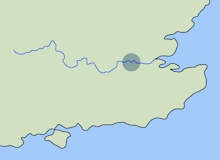
London is a city permanently playing catch-up. Its five main airports serve more than 175 million passengers a year, and there is demand for even more to travel in and out of the UK’s capital city by air; however, the lack of capacity is currently stopping this from happening.
London’s main hub Heathrow Airport handles more than 65 million passengers a year. Despite constant improvements to keep pace with increasing passenger numbers – including the recently opened terminal 5 and the reconstruction of terminal 2 – the main limiting factor of the airport’s infrastructure is its two runways. The idea of a third runway at the site has been debated for years. A formal proposal was approved by then-Transport Secretary Geoff Hoon in January 2009 for the addition of a runway and a sixth terminal. On assuming office in May 2010, the UK’s newly formed coalition government promptly dropped the third runway proposal of the previous Labour administration, citing fierce local opposition to the environmental impact of increased noise and air pollution that the extra runway would cause.
Several members of the government have supported plans for an entirely new hub airport to be built in the Thames Estuary, east of London, free from the expansion constraints that plague Heathrow’s west London location.
This airport would be built on an island, with a high-speed rail link into the city centre, as well as road and river links. By placing the airport in the estuary, aircraft would no longer fly over central London, and there would be no restrictions on arrival and departure hours, as is the case at Heathrow.
Earlier this year, the UK Government announced a formal consultation on the construction of a Thames Estuary airport. While no plans have yet been given the green light, parties for and against the plans have come out in force. Chief among the opposition’s concerns is the impact the estuary airport would have on wetland bird populations. Also, the required investment in the project would cost billions more than the expansion of Heathrow, and it would take longer to build at a time when London is in dire need of extra capacity.
For
Boris Johnson, London Mayor
"I believe there would be considerable benefit from providing capacity at a new airport, which can act as a hub. Heathrow is not the answer. Its confined and unsuitable location means it cannot grow to a size comparable to the expanded airports at Frankfurt, Madrid, Amsterdam and Dubai."
How well do you really know your competitors?
Access the most comprehensive Company Profiles on the market, powered by GlobalData. Save hours of research. Gain competitive edge.

Thank you!
Your download email will arrive shortly
Not ready to buy yet? Download a free sample
We are confident about the unique quality of our Company Profiles. However, we want you to make the most beneficial decision for your business, so we offer a free sample that you can download by submitting the below form
By GlobalDataLord Foster, architect
"We need to recapture the foresight and political courage of our 19th-century forebears if we are to establish a modern transport and energy infrastructure in Britain for this century and beyond. Britain can no longer trade on its inadequate and aged infrastructure.
Against
Colin Matthews, CEO, BAA
"The consequences of closing Heathrow wouldn’t just be big for my company: it would be big for 100,000 jobs in this part of London. It’s a huge issue economically, a huge issue politically."
Paul da Zylva, England campaigns coordinator, Friends of the Earth
"The aviation industry has been selling our environment down the river for far too long."
Martin Harper, conservation director, RSPB
"There is no economic argument for destroying a vital habitat for thousands of wetland birds. We would be horrified if this act of environmental vandalism goes ahead."







